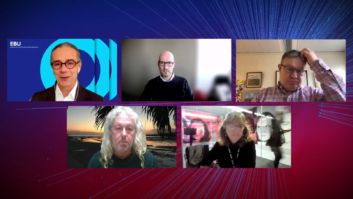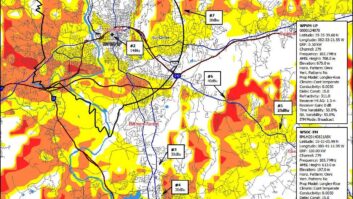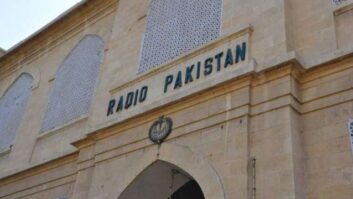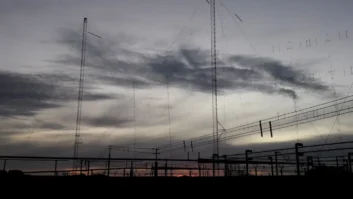Digital Radio Update – March 28, 2007
Mar 28, 2007 9:00 AM, By Mark Krieger, CBT
Stay up to date on the latest IBOC news, business and technology information with the twice-monthly newsletter from Radio magazine.
Index:
- FCC Adopts Second R&O on Digital Radio
- Conditional Access on the Agenda at NAB2007
- Ibiquity Names Monetti to Head Latin Market Development
- BE Hosts HD Radio Reception at NAB2007
- Dice Adds Text Display on Hondas, Acuras
- Chicago Tribune Says Motorola’s Iradio in Limbo
- Controversy Surrounds Digital SCA Claims
- Dice Adds Text Display on Hondas, Acuras
- IBOC by State: Wyoming
- An Introduction to the New Language Surrounding HD Radio
To receive these articles twice a month in your e-mail, subscribe to the Digital Radio Update – Insight to IBOC e-newsletter. Click here to subscribe.
News

FCC Adopts Second R&O on Digital Radio
The FCC commissioners voted unanimous approval of its long awaited Second Report and Order, First Order on Reconsideration, and Second Further Notice of Proposed Rulemaking concerning IBOC digital radio broadcasting last Thursday, codifying a wide range of options for broadcasters broadcasting an HD Radio signal. The new rules seem to offer something for just about everyone.
AM stations will finally be permitted to operate IBOC digital hybrid operation on a 24 hour basis and the commission will institute a standard operating procedure to deal with adjacent channel interference complaints. Digital retransmission of analog content is required.
FM stations will be permitted to operate in extended hybrid mode allowing for a maximum data throughput of 147kb/s. FM digital broadcasters will be required to carry one digital simulcast of their main analog channel audio but will be permitted flexibility in how they allocate their remaining bandwidth for datacasting, multicasting and subscription services. Leasing bandwidth to third parties is permissible, though subject to “certain regulatory requirements.”
FM translators, boosters and LPFMs are authorized for IBOC hybrid operation, where feasible.
There is no requirement or timetable set for digital conversions, and full digital operation is not permitted�stations may only operate in analog/digital hybrid modes. Existing programming and operational statutory and regulatory requirements (i.e. EAS, public service, obscenity/indecency) are extended to all free DAB programming streams.
Among those issues that the FCC intends to revisit in its next consideration of proposed rulemaking are additional public service requirements for digital multicasters, and possible limits on how much subscription content may be offered.
The commissioners also dismissed several Petitions for Reconsideration and Petitions for Rulemaking that asked, inter alia, the commission to reconsider the adoption of Ibiquity’s in-band, on-channel (IBOC) system as the technology chosen for DAB transmission, effectively securing Ibiquity Digital’s current lock on the U.S. digital radio market.
The new rules will become effective 30 days after the FCC posts notice of the action in the Federal Register.
Conditional Access on the Agenda at NAB2007
The topic of subscription-based services will be on the HD Radio agenda at NAB2007’s Engineering Conference, as Tom Rucktenwald, director of data applications delivery at NDS Americas, will discuss conditional access implementation within a digital radio framework.
Entitled “HD Radio Conditional Access: What It Is; How It Fits In the Broadcast Station; and Why It Can Provide Outstanding Return on Investment,” Rucktenwald’s presentation will explore “how conditional access equipment fits into the station, mates to other equipment that may already be within the station, operates within the station’s work flow, and creates new operations that the station must perform.”
NDS Americas’ expertise in the field of digital rights management was tapped by Ibiquity Digital to develop an access control system for selected HD multicast content. Some broadcasters are said to be eyeing the possibility of offering premium content subscription services to build non-traditional revenue as HD Radio develops in the marketplace.
NPR has expressed interest in conditional access as a possible application for controlling the distribution of specialized programming previously delivered through the use of analog SCA channels and leased receivers, such as reading services for the blind.
Rucktenwald’s presentation will take place on Sunday, April 15 at 11:00 a.m. in Meeting Room S226 of the Las Vegas Convention Center.
Business
Ibiquity Names Monetti to Head Latin Market Development
Ibiquity Digital has hired Fernando Monetti as manager of broadcast business development for Latin America. In his new role Monetti will manage and develop demand for HD Radio broadcasting in Central and South America, where interest in HD Radio in increasing as 16 stations roll out the technology in Brazil.
Monetti, who will report to Ibiquity’s international broadcast business development director, Perry Priestley, joins Ibiquity after serving as a sales manager with Thales. He also held related posts with FDM in Buenos Aires, and Consolidated Media Systems.
BE Hosts HD Radio Reception at NAB2007
Broadcast Electronics (BE) will sponsor an HD Radio Reception at NAB2007 on Monday, April 16, from 4:30 p.m. to 6:00 p.m. in the Radio Hall of the Las Vegas Convention Center. The event is intended to allow broadcasters to unwind and network with other professionals interested in HD Radio developments at the conclusion of opening day on the exhibition floor.
The event is only one facet of BE’s focus on HD at the convention, as company engineers and managers are scheduled to present four papers during the NAB Broadcast Engineering Conference. Other related events include presentations at the NAB Radio and Audio Stage, and an HD Radio engineering seminar on Saturday, April 14. BE will also conduct ongoing HD multicasting, messagecasting and HD advanced service demonstrations at its booth during exhibition hours.
Details can be found in advance on BE’s website or by stopping by booth N7106 during the show.
Chicago Tribune Says Motorola’s Iradio in Limbo
Motorola’s once-ballyhooed Iradio project has been shelved indefinitely, according to Mike Hughlett’s March 12 report in the Chicago Tribune. Problems contributing to the delay are said to include less than stellar system performance and a weak business model.
As previously promoted in Motorola press releases, the Iradio system was conceived as a multi-stage platform combining Motorola cellular phones with a Bluetooth-equipped interface to allow consumers to wirelessly download Internet radio from their handset into their car audio system. A home or laptop PC with Internet connectivity was also required to facilitate Web radio selection. Roll-out of the technology was originally planned for late 2005.
“There are some monetizing issues we have to get through,” Paul Alfieri, a Motorola spokesman, was quoted in the Tribune article. “We are figuring out the business model right now for both of us,” Alfieri said, in reference to Motorola and the wireless networks.
The article also speculated that some wireless carriers were less than accommodating to the technology because it competed with their own roll-out of broadband audio services.
Eye on IBOC

Controversy Surrounds Digital SCA Claims
News of a radical new digital subcarrier generation technique that touts its ability to add as many as 50 MPEG-3 audio channels to analog FM broadcast channels is generating waves–and friction–inside the radio industry.
The company making the claim, Compress Technologies (CTLG), has entered into agreements with two firms, Ludwig Enterprises and New Century Services, for deployment of a proprietary system to generate digital subcarriers that could allow 50 independent channels of compressed digital audio programming to be carried on existing analog FM radio stations in Mexico, Haiti and Canada. A March 6 press release claims that Ludwig will transfer $2 million to CTLG to seal its license agreement for the technology.
But stories about CTLG’s business ventures in the Wall Street Journal and CNBC news sites have come under scrutiny in recent weeks. One skeptic, Derek Kumar, of Digital Radio Express has challenged CTLG’s technical claims in letters to Radio magazine and other trade publications. Kumar’s firm is currently marketing its own digital SCA transmission product known as FM Extra.
At the heart of Kumar’s criticism is CTLG’s claim to be able to deliver a minimum of 15 channels of digital audio using what it calls “FM-SCA” technology employing VMSK digital modulation. The problem, according to Kumar, is that CTLG’s own documents indicate that the technology does not meet any accepted description of an FM SCA. He goes on to note that CTLG’s technical data suggest that the technology might at best be described as an IBOC or even IBAC modulation scheme. Indeed, some of CTLG’s own press releases note that FM stations are never assigned adjacent channels in the same market, suggesting that some sort of IBAC implementation may actually be in play.
The issues that Kumar’s letters raise are insightful, and are likely to trigger further technical investigation by other industry experts. Those inquiries, in turn, ought to be of interest to the investment community.
Are CTLG’s claims the beginning of a remarkable multicast revolution for terrestrial radio, or merely pure digital snake oil?
Stay tuned.
Dice Adds Text Display on Hondas, Acuras
Dice Electronics’ HD Dice add-on HD Radio receiver with an integrated Ipod audio source now supports text display on selected Honda and Acura vehicles. The new feature allows the OEM audio system’s track control buttons to tune between HD Radio stations, or use them to control a user’s Ipod through an optional cable interface available with the HD Dice. In addition, text information from the HD Dice is shown on the OEM audio main display when new content is available.
The HD Dice is also available for selected vehicles of Toyota, Lexus, Scion, BMW, Mini Cooper, Buick, Cadillac, Chevrolet, GMC, Hummer, Oldsmobile, Pontiac, Honda and Acura models and includes Ipod integration and aux inputs.
IBOC Across America
IBOC By State: Wyoming
Ibiquity has a list of stations that have licensed HD Radio technology and notes those that are on the air now. IBOC by state looks at various states and list the stations that are making the transition.
There are 16 stations broadcasting 23 HD Radio channels in the Equality State.
MarketStationHD1 FormatHD2 FormatHD3 FormatOwner BuffaloKBUW-FM 90.5News/AAA–University of Wyoming DouglasKDUW-FM 91.7NPR–University of Wyoming ClearmontKLQQ-FM 104.7Top 40Real OldiesJoke JokeLovcom AftonKUWA-FM 91.3News/AAA–University of Wyoming CasperKUWC-FM 91.3News/Alternative–University of Wyoming SundanceKUWD-FM 91.5News/AAA–University of Wyoming GilletteKUWG-FM 90.9NPR–University of Wyoming JacksonKUWJ-FM 90.3News/AAA–University of Wyoming NewcastleKUWN-FM 90.5NPR–University of Wyoming PowellKUWP-FM 90.1News/AAA–University of Wyoming LaramieKUWR-FM 91.9News/AAAClassical-University of Wyoming ThermopolisKUWT-FM 91.3News/AAA–University of Wyoming PinedaleKUWX-FM 90.9NPR–University of Wyoming Rock SpringsKUWZ-FM 90.5News/AAA–University of Wyoming SheridanKYTI-FM 93.7CountryFoggy Mountain – Classic CountryAir AmericaLovcom SheridanKZWY-FM 94.9RockNitro-Active RockESPN RadioLovcom
HD Radio Terminology
An introduction to the new language surrounding HD Radio.
mask: the boundaries set for RF spectrum emission
multicasting: the ability of HD Radio to transmit more than one audio stream. The Main Program Service (MPS) is a simulcast of the main-channel analog stream. The Supplemental Program Service (SPS) provides additional audio streams.












